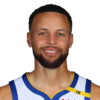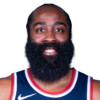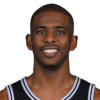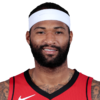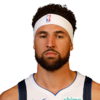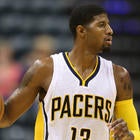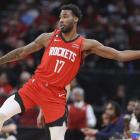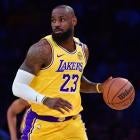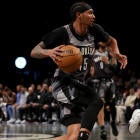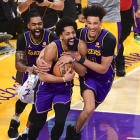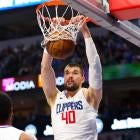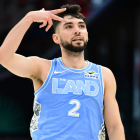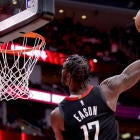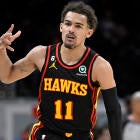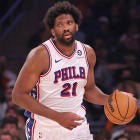Your first-round pick is going to be awesome. It doesn't matter who it is, he's going to be great. You drafted him. Look at his ceiling! Look at how well he played in March! There's only blue sky ahead.
All of your opponents drafted busts. Of course they did -- they're a bunch of amateurs! Can't they see how risky their first-round picks are? How do they not know about their injury history or that new signing who is going to cut into their minutes? It's a good thing your league-mates drafted those players, because you weren't touching them.
If you want, you can make any player sound like a can't-miss star. All you have to do is throw on rose-colored glasses and accentuate the positives. It is equally simple to make any player look like a sure bust. All you have to do is adopt a Debbie Downer persona and pick apart their flaws -- every player has them, after all.
In the interest of balance, here are the best and worst possible scenarios of each player currently going in the first round in leagues tracked at FantasyPros.com's average draft position.
Best case scenario: The Warriors don't quite roll through the league like they did last season, which forces Stephen Curry back up to the 35-MPG range. He breaks the 300 3-pointer barrier, while averaging 25-8.5-4.5 -- while leading the league in steals and free-throw percentage again.
Worst case scenario: There really isn't one. He's missed just 10 games over three seasons since undergoing surgery to fix his once-balky ankles, and Curry really doesn't have a weak point in his game. The farthest I could realistically see him falling is fourth overall -- nobody has that kind of floor.
Best case scenario: Anthony Davis might average 27 points, 11 rebounds and 4 assists per game for a full season. That's entirely within the realm of possibility. He did that last March. In what should be an improved offense, Davis might stretch out to 3-point land, adding 30 or 40 3-pointers to his already unmatchable resume. With the gains he made as a playmaker late last season, Davis' upside is unprecedented.
Worst case scenario: Injuries are the only thing that can hold him back. It would be pretty surprising if the 22-year-old plateaued statistically this season, given the gains he has made in each year and his burgeoning skill set. However, he has never played more than 68 games in a season, with a variety of maladies costing him time in each season. If there's one way Davis doesn't finish the season as the top Fantasy option, it is through his inability to stay healthy.
Best case scenario: James Harden is a lot like Curry, in that his floor is extremely high. He has missed just 24 games in six NBA seasons and has no glaring flaws in his game. He is one of the best 3-point shooters in the league, a free-throw machine and an underrated passer. However, it's also hard to see him breaking into the Curry/Davis/Kevin Durant (we'll get to him) tier. He might be the surest thing in Fantasy at this point, but No. 1 overall ceiling probably isn't in the cards.
Worst case scenario: Maybe the minutes catch up to him? Only two other players have logged as many minutes as Harden over the last two seasons, so it's possible the wear-and-tear catches up to him the way Durant's did last season. Otherwise, perhaps a healthy Dwight Howard and the addition of Ty Lawson cut into his numbers just enough to bump him out of the top-five overall. It's hard to see that happening.
Best case scenario: Motivated by another tough loss in the Finals, LeBron James hits the ground running and avoids the sloppy start he suffered through last season. James averaged 25.3 points, 6.6 rebounds, 7.3 assists and 2.5 combined blocks and steals per game following his return from sabbatical in late December, and proved in the postseason he can still contort the box score like few in league history.
Worst case scenario: The weak Eastern Conference gives the Cavaliers the freedom to not worry too much about seeding, which means James should have the opportunity to take some time off again. Given that he is already complaining about the offseason not giving him enough time to recovery from another lengthy playoff run, I would expect those two weeks off in December to recuperate to become a yearly feature of the LeBron James experience.
Best case scenario: Kevin Durant's extensive foot troubles last season prove to be a blip in the radar, and he returns and is one again a contender for the No. 1 overall Fantasy spot. With Enes Kanter around and Serge Ibaka's extended range, the opportunity for more assists allows Durant to creep up to the 6.0 range, putting 30-8-6 in play; only Michael Jordan and Oscar Robertson have done that.
Worst case scenario: Three surgeries in a year aren't enough to keep Durant healthy, and he follows the Yao Ming/Brook Lopez path to a severely truncated career. Let's not think of such things.
Best case scenario: Russell Westbrook builds on his historic end to the 2014-15 and remains the Thunder's go-to guy as Durant works his way back in slowly. He won't take quite as many shots as last season, but Durant's presence allows him to be even more efficient, taking his game to another level, especially as a passer. 25-6-9 with career-best shooting numbers push him into the top-3 discussion for Fantasy.
Worst case scenario: Westbrook isn't without his own injury concerns; he missed 36 games in 2013-14 due to a recurring knee issue, and his missed the start of last season with a hand injury. And let's not forget, the last time he played with Durant healthy, his averages fell to 21.8 points, 5.7 rebounds and 6.9 assists; terrific numbers, but hardly enough to justify his draft stock.
Best case scenario: Chris Paul continues to age gracefully, averaging a double-double with nearly 20 points per game for the third straight season. After dipping for a few years, Paul builds on his strong finish and gets back to the days of shooting 40 percent from 3-point range; this time, however, he's making 150-plus of them over the course of the season.
Worst case scenario: After playing his most minutes since 2010-11, Paul succumbs to more of the nicks and scratches that caused him to miss 32 games between 2012-13 and 2013-14. The Clippers' increased reliance on DeAndre Jordan as a scorer dips into Paul's scoring and assists as well, and he settles in as a clear No. 5 at the position.
Best case scenario: DeMarcus Cousins puts it all together under George Karl, emerging as a defense-destroying force the likes of which we haven't seen since Shaquille O'Neal. Cousins and Karl got off to a rocky start last season, but Karl entrusts Cousins with running more of the offense, and a second season in the system allows him to cut into his astronomical turnover rate. He becomes the first player to average 25 points, 12 rebounds, 4 assists and 1.5 steals since Charles Barkley -- and only the third ever.
Worst case scenario: Cousins' and Karls' combustible relationship catches on fire (probably with a match set by Rajon Rondo). Cousins' health is adversely impacted by the Kings' breakneck pace -- he complained of overuse late last season -- and he singlehandedly loses the turnover category for you.
Best case scenario: In the wake of four lost starters, the Blazers are forced to lean on Damian Lillard to an even greater degree, and he emerges as the next Curry. Maybe he can't match Curry's efficiency with this supporting cast, but Lillard can make up for it with sheer volume, morphing into some kind of demonic blend of 2014-15 Westbrook and Curry. With a green light from everywhere on the floor, Lillard might lead the league in scoring.
Worst case scenario: The burden of carrying the league's worst offense catches up to him; think 2014-15 Carmelo Anthony. Lillard's struggles to hit 40 percent of his shots with defenses keyed into him, and his turnover numbers go through the roof. Let's just hope he can stay healthy, unlike Anthony.
Best case scenario: John Wall thinks he should be in the MVP discussion, and it's not hard to see a path for him to get there. He probably needs to boost his scoring a bit from last season's 17.6 per game, and he could do that by getting backt o 2013-14's shooting; he made a career-best 1.3 3-pointers per game en route to his 19.3 per game scoring average. 20 points, 10 assists would certainly put him in the MVP conversation, and at 25, it's entirely within his grasp in what looks like a much-improved Wizards offense.
Worst case scenario: Wall had trouble staying healthy early in his career, missing 46 games over his first three seasons. That hasn't been much of an issue over the last two years, but the concern hasn't disappeared entirely. If he stays healthy, Wall is a consistent double-double threat, though talk about him going out of his way to reduce his turnover rate makes me worry we'll see a safer, less explosive Wall -- and that wouldn't be a good thing.
Best case scenario: The Knicks have been at their best when Carmelo Anthony has spent extensive time at the power forward in recent seasons; the extra shooting opens up space on the floor for Anthony to work. They don't seem intent to play him at the four this season, but the addition of Kristaps Porzingis could have a similar impact, with his shooting and rim-protection providing the best of both worlds. After a tough first season in the triangle on a roster devoid of talent, the resurgent Knicks could help Anthony contend for a scoring title yet again.
Worst case scenario: After years of playing huge minutes and carrying a heavy scoring load, staying healthy might just not be in the cards for Anthony anymore. After he missed 42 games in 2014-15, Anthony's knee continues to give him issues, and his age makes it tougher to cover up the flaws in his game.
Best case scenario: As a small forward, Paul George was a tough cover. As a power forward, he's unguardable. He might not be thrilled with the idea of banging around down low with the likes of Zach Randolph and Pau Gasol, but he's going to love how wide open the court looks with those lumbering bigs chasing him around. A 25-7-4 season isn't out of the question with the Pacers' newfound predilection for speed.
Worst case scenario: Coming off a traumatic, season-ending injury, a new more physically taxing role isn't exactly the safest option. Even if George manages to stay healthy after missing all but six games in 2014-15, there's a chance the position change doesn't stick and his offensive game suffers with the new defensive responsibilities.
Best case scenario: Klay Thompson looked like a new player in Steve Kerr's offense early last season, making more adventurous forays to the basket that led to improved efficiency and new scoring highs. That slowed down a bit as the season went on, but with a full season in the system under his belt, Thompson has another jump in him. Already one of the best scorers ever Thompson can develop into an even more dangerous weapon by improving his playmaking.
Worst case scenario: Thompson's scoring tailed off as the season went on, to the point where he was averaging fewer points in the playoffs than any previous month of the season. He has a safe floor thanks to his incredible shooting, but his all-around game can't afford much slippage if he is to be worth a top-12 pick.
Best case scenario: Kawhi Leonard is almost certainly going to score less than anyone on this list. Of course, when you are a plus contributor in every single other category, that doesn't matter much. The signing of LaMarcus Aldridge likely cements Leonard's place as a secondary scorer, however that doesn't mean Leonard can't continue improving; Aldridge's signing likely means Tim Duncan takes a step back, not Leonard. As a do-everything stud, no player will help you in as many ways without any weaknesses.
Worst case scenario: You forget you are playing in a H2H points league; Leonard is perhaps the best example of how a player can jump from solid to elite depending on the scoring formats. Otherwise, Leonard represents a riskier investment than most think, thanks to an injury history that has seen him miss extensive time in each season of his career. They've all been unrelated, fluke injuries, but you have to wonder why it keeps happening to Leonard, and whether it will continue moving forward.
Best case scenario: Like the Warriors, the Hawks were able to give their stars like Al Horford more rest than most teams; winning by 15 every night grants you that opportunity. With DeMarre Carroll off to Toronto and the team generally expected to take a step back, Horford should benefit as a potential hub the offense can work around. Horford could turn the clocks back to 2013-14, when he averaged 18.6 points, 8.6 rebounds, 2.6 assists and 2.4 combined blocks and steals on terrific efficiency; he was a first-round value not that long ago, and this is a contract year.
Worst case scenario: The Hawks want to copy the Spurs' path to success, and that path necessitates players willingly taking on smaller roles than they might be worth on other teams. With Tiago Splitter on the roster, the Hawks will be able to split time even more in the frontcourt, which could push Horford down below the 30 MPG mark for the first time in his career.
![[object Object] Logo](https://sportshub.cbsistatic.com/i/2020/04/22/e9ceb731-8b3f-4c60-98fe-090ab66a2997/screen-shot-2020-04-22-at-11-04-56-am.png)

